9 Aug 2017 | Campaigns -- Featured, Statements, Turkey, Turkey Statements
[vc_row][vc_column][vc_column_text]
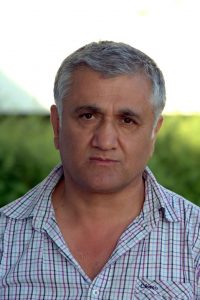
Hamza Yalçın (Photo: Odak magazine)
The arrest of Turkish-Swedish journalist Hamza Yalçın by Spanish authorities is a gross abuse of the Interpol international arrest warrant system and a brazen attempt to stifle press freedom by Turkey’s president, Recep Tayyip Erdogan. Index on Censorship calls on Spanish authorities to allow Yalçın to return to Sweden.
Yalçın was detained at Barcelona’s El Prat airport on 3 August following an international arrest warrant through Interpol initiated by Turkey.
A day later he was arrested by Spanish police on charges of “insulting the Turkish president” and “terror propaganda” related to an article he wrote for Odak magazine. Yalçın was the chief columnist for Odak and the coordinator for its Training and Solidarity Movement. On 18 March, Turkish prosecutors launched an investigation into Doğan Baran, Odak’s managing editor, and Yalçın for his article entitled The Latest Developments in the Military and the Revolutionary Struggle. Both Baran and Yalçın face charges for “insulting the president” and “denigrating the military.”
“This is a clear abuse of the Interpol system because it is a direct violation of Article 2 of its constitution, which requires respect for fundamental rights and freedoms of individuals. It is extremely concerning that an exiled journalist can be arrested for exercising their right to freedom of expression,” said Hannah Machlin, project manager for Mapping Media Freedom, Index on Censorship’s project monitoring press freedom in Turkey and 41 other European area countries.
The Spanish authorities now have 40 days to decide whether to extradite Yalçın back to Turkey.
“Index demands Spain free Hamza Yalçın and allow him to return to his home in Sweden,” Machlin added.
Yalçın was arrested in 1979 on charges of being linked to the People’s Liberation Party-Front of Turkey (THKP-C) Third Way organization. Odak reported that Yalçın was given two consecutive life sentences by the military junta, which was then in control of the Turkish government, for his “revolutionary activities.” He was granted asylum by Sweden and has lived there since 1984.
Odak magazine, which is campaigning for his release, said in a statement that Yalçın “has been made into a target many times for his articles and values.”
The Council of Europe’s parliamentary assembly published Resolution 2161 in April 2017 on the abuse of the Interpol system. The resolution underlined that “in a number of cases in recent years, however, Interpol and its Red Notice system have been abused by some member States in the pursuit of political objectives, in order to repress freedom of expression.” [/vc_column_text][vc_separator][vc_custom_heading text=”Media freedom is under threat worldwide. Journalists are threatened, jailed and even killed simply for doing their job.” font_container=”tag:h3|text_align:left” use_theme_fonts=”yes” link=”url:https%3A%2F%2Fwww.indexoncensorship.org%2Fcampaigns%2Fpress-regulation%2F|||”][vc_row_inner][vc_column_inner width=”1/2″][vc_column_text]Index on Censorship monitors press freedom in Turkey and 41 other European area nations.
As of 9/8/2017, there were 503 verified incidents associated with Turkey in the Mapping Media Freedom database.[/vc_column_text][/vc_column_inner][vc_column_inner width=”1/2″][vc_column_text]Index on Censorship campaigns against laws that stifle journalists’ work. We also publish an award-winning magazine featuring work by and about censored journalists. Support our work today.[/vc_column_text][/vc_column_inner][/vc_row_inner][vc_separator][/vc_column][/vc_row][vc_row][vc_column][vc_basic_grid post_type=”post” max_items=”12″ style=”load-more” items_per_page=”4″ element_width=”6″ grid_id=”vc_gid:1502284900540-fbb3abe9-4651-4″ taxonomies=”55″][/vc_column][/vc_row]
7 Aug 2017 | Campaigns, Campaigns -- Featured, Statements, Turkey, Turkey Statements
[vc_row][vc_column][vc_column_text]
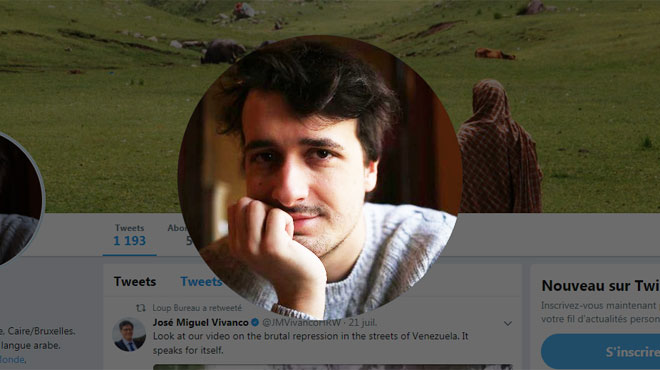
Loup Bureau is being held by Turkish authorities
Index on Censorship urges Turkish authorities to immediately release French journalist Loup Bureau and drop all charges against him.
Freelance journalist Loup Bureau was arrested in Şırnak on charges of terrorism-related activities.
“Turkish authorities have been using terrorism charges to restrict access to information and silence journalists,” Index on Censorship’s head of advocacy Melody Patry said. “By arresting journalists simply for doing their job, Turkey violates the fundamental right to seek, receive and impart information. The charges against Loup Bureau are groundless and we call for his immediate and unconditional release.”
Euronews reported that the journalist was first detained on 26 July at Habur, where he was crossing into Turkey from Iraq.
After five days in police custody, he was charged and taken to a prison in the town of Şırnak on 1 August.
Turkey is the world’s top jailer of journalists, with over 100 currently in prison. The crackdown on media freedom intensified in the aftermath of the coup attempt last July 2016 and under the state of emergency that followed.
The arrest of Bureau takes place just two months after another French journalist, Mathieu Depardon, was deported from Turkey one month after his arrest in Gaziantep. The European Federation of Journalists reports that Deniz Yücel, Turkish correspondent for the German newspaper Die Welt is still behind bars as of February and French national Olivier Bertrand was deported in November 2016 while he was working on a report focused on the post-coup situation in Turkey.[/vc_column_text][vc_separator][vc_custom_heading text=”Media freedom is under threat worldwide. Journalists are threatened, jailed and even killed simply for doing their job.” font_container=”tag:h3|text_align:left” use_theme_fonts=”yes” link=”url:https%3A%2F%2Fwww.indexoncensorship.org%2Fcampaigns%2Fpress-regulation%2F|||”][vc_row_inner][vc_column_inner width=”1/2″][vc_column_text]Index on Censorship monitors media freedom in Turkey and 41 other European area nations.
As of 7/8/2017 there were 500 verified violations of press freedom associated with Turkey in the Mapping Media Freedom database.[/vc_column_text][/vc_column_inner][vc_column_inner width=”1/2″][vc_column_text]Index on Censorship campaigns against laws that stifle journalists’ work. We also publish an award-winning magazine featuring work by and about censored journalists. Support our work today.[/vc_column_text][/vc_column_inner][/vc_row_inner][vc_separator][/vc_column][/vc_row][vc_row][vc_column][vc_basic_grid post_type=”post” max_items=”12″ style=”load-more” items_per_page=”4″ element_width=”6″ grid_id=”vc_gid:1502110018823-3f3d8c6f-bee4-8″ taxonomies=”55″][/vc_column][/vc_row]
28 Jul 2017 | Awards, Fellowship, Fellowship 2017, News, Turkey
[vc_row][vc_column][vc_single_image image=”89666″ img_size=”full” add_caption=”yes” alignment=”center”][vc_separator color=”black”][vc_column_text]Digital Activism award-winner Turkey Blocks continues to monitor internet freedom in Turkey. Since the Index on Censorship Freedom of Expression Awards, Turkey Blocks has expanded its use of NetBlocks, a programme which they use to track internet freedom and the flow of information online, as well as studying the impact of censorship.
Established in 2015, Turkey Blocks has served as a platform to monitor and report internet shutdowns using an open source tool it developed, which has been adopted by other organisations. With this tool, it has exposed 14 instances of mass-censorship.
Beyond monitoring internet freedom, Turkey Blocks has been campaigning using the information it gathered. According to founder Alp Toker, “We’ve put the spotlight on compliance by western corporations – elective censorship, withholding of content and geoblocking – particularly as it affects vulnerable communities in Turkey.” Staff have also been analysing the financial impacts of mass-censorship incidents. “Increasingly we find that economic criteria can succeed where human rights arguments are ignored,” Toker said.
Turkey Blocks is campaigning to make the internet more accessible from the policy side too, by gaining representation in bodies that define internet standards to “…ensure that human rights considerations are built into core infrastructure”, Toker told Index.
“The Freedom of Expression Award came at a time when Turkey faced unprecedented challenges to civil liberties and human rights. The recognition draws attention to our struggle to defend the online spaces citizens need to think freely and speak out,” Toker said. Index has connected Turkey Blocks with other human rights groups and communities that share similar goals of internet freedom.
Toker highlighted the Turkish government’s blocking of Wikipedia as a pressing concern for digital freedom in the country. Governments are unable to block individual pages, and on 29 April Turkey Blocks reported a full block of Wikipedia, which is ongoing. Toker calls this block “the ultimate act of digital self-harm…Turkish citizens are no longer able to edit articles with their own worldview; instead, they are left to watch from a distance as the international community picks up editorial control of Turkey’s history, culture and politics, defining the geopolitical narrative today and for generations to come.”
Moving forward, Turkey Blocks will work at using their measurement systems to empower ordinary citizens and independent media. “Our recent work has focused on bridging the terminology and requirements of the media freedom community with capabilities and expertise in the information security space,” Toker said.
“We’ve found that the mere act of systematic observation and record-keeping can discourage mass-censorship,” Toker told Index, so the team is working on scaling up to cover a wider geographic area, as well as pinpointing small disruptions.
From travelling and speaking at conferences, Toker emphasized that Turkey’s internet regulations are not that different from the rest of the world. “Our message on the international track is that the media freedom community needs to move faster to keep pace with innovation; it will be difficult, after all, to reclaim those spaces and win back those rights if we let go of them now.” He is adamant that digital rights are essential to other human rights, “Digital rights can seem abstract, even distant, in the context of Turkey’s national state of emergency, with ever-tightening restrictions around journalism and civil society. Yet none of those conversations can take place without a free and open internet. It’s important now, more than ever, to keep watch and to keep calling for more digital transparency and accountability from the authorities.
Additional reporting by Margaret Flynn Sapia[/vc_column_text][/vc_column][/vc_row][vc_row][vc_column][vc_basic_grid post_type=”post” max_items=”12″ style=”load-more” items_per_page=”4″ element_width=”6″ grid_id=”vc_gid:1503400925088-42244ba1-c62c-10″ taxonomies=”9034″][/vc_column][/vc_row]
24 Jul 2017 | Mapping Media Freedom, Media Freedom, media freedom featured, News, Turkey, Turkey Uncensored
[vc_row][vc_column][vc_column_text]
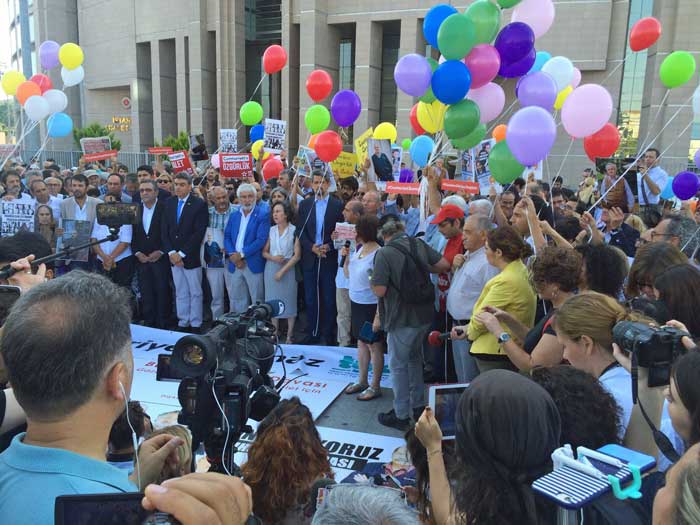
People gather in support of the Cumhuriyet defendants as the trial got underway.
Executives and columnists of Turkey’s critical Cumhuriyet daily go on trial this week, beginning Monday 24 July. The indictment seeks prison sentences for the defendants varying between 7.5 to 43 years. The charges for those on the board of the Cumhuriyet Foundation, which oversees the newspaper, include “abuse of power in office,” but all are accused of “supporting terrorist organisations” mainly through changes that have occurred in the paper’s editorial policy following the election of a new board to the foundation in 2013.
The prosecution’s claims are supported by views of several media experts — most of whom are former executives or employees terminated from various positions, according to Aydın Engin, a Cumhuriyet columnist who is also a defendant in the case although he was released pending trial due to his advanced age.
As Engin says “Cumhuriyet changed its editorial policy: this is the essence of the indictment.”
Indeed, the 435-page long document laments, page after page, that Cumhuriyet ditched its traditional, Kemalist, unyieldingly secularist and statist editorial policy and became a more open-minded newspaper.
The prosecutor states that by altering its editorial stance, the newspaper became a supporter of the so-called Fethullahist Terrorist Organization (FETÖ/PYD) — the name Turkish authorities give to the Fethullah Gülen network, which they say was behind last year’s coup attempt –, the Kurdistan Workers’ Party (PKK/KCK) and the Revolutionary People’s Liberation Party/Front (DHKP-C); three organizations with unrelated if not completely opposing worldviews.
“A newspaper changing its editorial policy cannot possibly be the subject of an indictment,” Engin says.
But did Cumhuriyet really change its editorial policy to legitimise the actions of FETÖ/PDY; PKK/KCK and DHKP/C as the prosecutor claims? “Every newspaper makes editorial policy changes as life unfolds. Cumhuriyet also did this. The paper caught up with the general tendencies in society such as increasing demand for freedoms, human rights and a stronger civil society.”
Engin says many of the witnesses who have testified against the Cumhuriyet journalists have been discredited as media professionals. “When I told the prosecutor that I will not respond to claims by people who have no reputation as journalists, he showed me a post by Professor Halil Berktay, who tweeted that ‘Cumhruiyet has become FETÖ’s media outlet.’ The prosecutor said, ‘This from a professor. Who are you to deny its validity?’
Engin: old and tired
Will any of the Cumhuriyet journalists be released at the end of this week? “I don’t even want to being to make any assumptions. This is not a legal trial; it is entirely political,” Engin replies, adding: “I strongly need them, personally, because I am 76 and tired,” says the energetic-looking journalist, who, as he speaks, is interrupted by someone asking him to sign a financial document. “See, I don’t even know what I just signed, I don’t know anything about these things.”
According to Engin, because those imprisoned are the key people to the newspaper’s operations, Cumhuriyet is now “half-paralyzed.”
But really, who are those in prison?
“Our brightest colleagues are in the can. Akın Atalay, is our CEO and I am a first-hand witness of how he has managed to keep the newspaper on its feet. Murat Sabuncu, he is perhaps one of the two or three finest journalists I know who can smell the news. He is publicly unheard of but Önder Çelik: he has been with Cumhuriyet for 35 years, he is the finest expert at things such as analyzing circulation reports, maintaining relations with printing houses; following paper prices..”
“I really need them to get out, but I don’t want to be dreaming.”[/vc_column_text][vc_row_inner][vc_column_inner][vc_separator color=”black”][/vc_column_inner][/vc_row_inner][vc_row_inner][vc_column_inner width=”1/2″][vc_custom_heading text=”Turkey” font_container=”tag:p|font_size:30|text_align:left” use_theme_fonts=”yes” link=”url:https%3A%2F%2Fmappingmediafreedom.org%2F|||”][vc_column_text]Index on Censorship monitors press freedom in Turkey and 41 other European area nations.
As of 24/07/2017, there were 496 verified reports of media freedom violations associated with Turkey in the Mapping Media Freedom database.[/vc_column_text][/vc_column_inner][vc_column_inner width=”1/2″][vc_single_image image=”94623″ img_size=”full” onclick=”custom_link” link=”https://mappingmediafreedom.org/#/”][/vc_column_inner][/vc_row_inner][vc_row_inner][vc_column_inner][vc_separator color=”black”][/vc_column_inner][/vc_row_inner][vc_row_inner][vc_column_inner][vc_column_text]The journalists on trial for the first time on 24 – 28 July:
 Akın Atalay (Cumhuriyet Foundation Executive President; imprisoned since Nov. 12, 2016): Facing 11 to 43 years in prison for “helping a terrorist organisation while not being a member” and “abusing trust”
Akın Atalay (Cumhuriyet Foundation Executive President; imprisoned since Nov. 12, 2016): Facing 11 to 43 years in prison for “helping a terrorist organisation while not being a member” and “abusing trust”
Atalay graduated from İstanbul University Law School in 1985. He has acted as the founding member of a number of civil society organisations and his academic studies on press freedom and the law have appeared in a large number of academic journals and newspapers. Since 1993, he has represented Cumhuriyet columnists and reporters as legal counsel. Currently, he is the newspaper’s executive president.
 Bülent Utku (Cumhuriyet Foundation Board Member, attorney representing Cumhuriyet; imprisoned since Nov. 5, 2016). Facing 9.5 to 29 years in prison for “helping a terrorist organisation while not being a member” and “abusing trust”
Bülent Utku (Cumhuriyet Foundation Board Member, attorney representing Cumhuriyet; imprisoned since Nov. 5, 2016). Facing 9.5 to 29 years in prison for “helping a terrorist organisation while not being a member” and “abusing trust”
Utku has worked as an attorney for 33 years. Since 1993, he has worked as a lawyer for Cumhuriyet columnists and journalists. He is also a member of the Cumhuriyet Foundation’s Board of Directors.
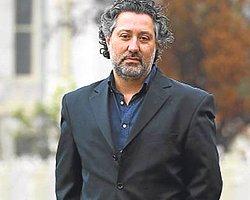 Murat Sabuncu (editor-in-chief, imprisoned since Nov. 5). Facing 7.5 to 15 years in prison for “helping a terrorist organisation while not being a member” [Turkish Penal Code (TCK) Article 314/2]
Murat Sabuncu (editor-in-chief, imprisoned since Nov. 5). Facing 7.5 to 15 years in prison for “helping a terrorist organisation while not being a member” [Turkish Penal Code (TCK) Article 314/2]
Sabuncu has been a journalist for 20 years. He started working at Cumhuriyet in 2014 as the newsroom coordinator. In July 2016, he took the helm as editor-in-chief.
 Kadri Gürsel (publications advisor, columnist, imprisoned since Nov. 5, 2015). Facing 7.5 to 15 years in prison for “helping a terrorist organisation while not being a member”
Kadri Gürsel (publications advisor, columnist, imprisoned since Nov. 5, 2015). Facing 7.5 to 15 years in prison for “helping a terrorist organisation while not being a member”
A journalist of 28 years, Gürsel started writing columns in Cumhuriyet in May 2016. He assumed the position of publications advisor for the newspaper in September 2016.
 Güray Öz (board member, news ombudsman, columnist, imprisoned since Nov. 5, 2015). Facing 8.5 to 22 years in prison for “helping a terrorist organisation while not being a member” and a single count of “abuse of power in office”
Güray Öz (board member, news ombudsman, columnist, imprisoned since Nov. 5, 2015). Facing 8.5 to 22 years in prison for “helping a terrorist organisation while not being a member” and a single count of “abuse of power in office”
Öz has been a journalist for 21 years. He has worked at Cumhuriyet since 2006. He is a columnist for the newspaper and has been its ombudsman since 2013. Öz is also on the board of directors of the Cumhuriyet Foundation.
 Önder Çelik (board member, imprisoned since Nov. 5, 2016). Facing 11.5 to 43 years in prison for “helping a terrorist organisation while not being a member” and four counts of “abuse of power in office”
Önder Çelik (board member, imprisoned since Nov. 5, 2016). Facing 11.5 to 43 years in prison for “helping a terrorist organisation while not being a member” and four counts of “abuse of power in office”
Önder Çelik has been a newspaper administrator for 35 years. He has worked as the print coordinator for the newspaper between 1981 – 1998. He returned to the same position in 2002 after a hiatus. He has been an executive board member since 2014 as well as a board member of the foundation.
 Turhan Günay (editor-in-chief of Cumhuriyet’s book supplement, imprisoned since Nov. 5, 2016). Facing 8.5 to 22 years for “helping a terrorist organisation while not being a member” and a single count of “abuse of power in office”
Turhan Günay (editor-in-chief of Cumhuriyet’s book supplement, imprisoned since Nov. 5, 2016). Facing 8.5 to 22 years for “helping a terrorist organisation while not being a member” and a single count of “abuse of power in office”
A journalist for 48 years, Günay has been with Cumhuriyet since 1987. For the past 25 years, he has worked as the chief editor for Cumhuriyet’s literary supplement, the country’s longest running weekly publication on books. The indictment insists he is a board member of the foundation; although he isn’t; a fact he reiterated in his testimony to the prosecutor.
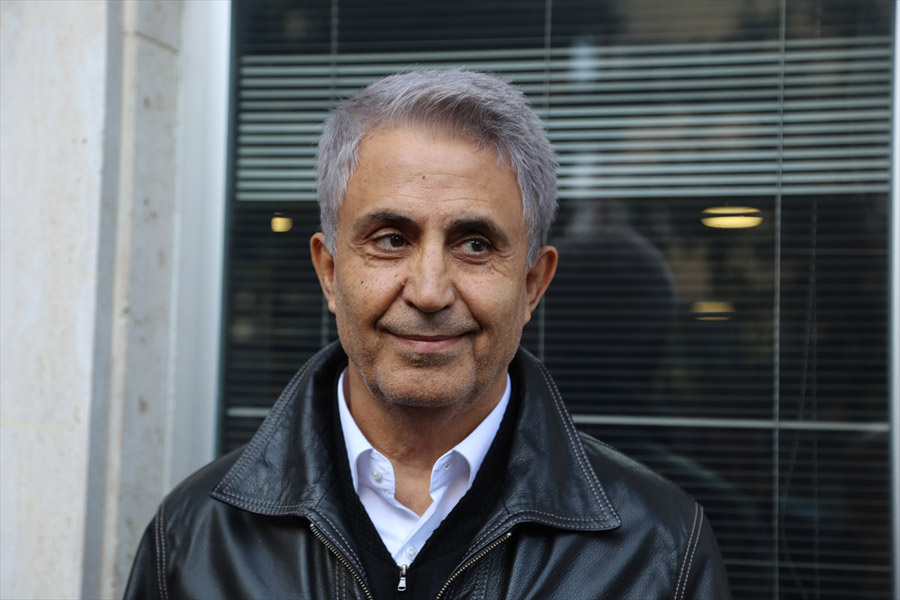
Musa Kart
Musa Kart (Cartoonist, board member, imprisoned since Nov. 5, 2016) Facing 9.5 to 29 years in prison for “helping a terrorist organisation while not being a member” and “abusing trust”
Musa Kart, one of Turkey’s most renowned cartoonists, has been drawing political cartoons for 33 years. He has been a Cumhuriyet journalist since 1985. For the past six years, Kart has drawn the front-page cartoons for Cumhuriyet.
 Hakan Karasinir (board member, imprisoned since Nov. 5). Facing 9.5 to 29 years in prison for “helping a terrorist organisation while not being a member” and two counts of “abuse of power in office”
Hakan Karasinir (board member, imprisoned since Nov. 5). Facing 9.5 to 29 years in prison for “helping a terrorist organisation while not being a member” and two counts of “abuse of power in office”
Hakan Karasinir has been a journalist for 34 years. He has been with Cumhuriyet for 34 years. In the past he has held various editorial positions, including serving as the newspaper’s managing editor between 1994 and 2014. Since 2014, he has also written columns in the newspaper.
 Mustafa Kemal Güngör (attorney, board member, imprisoned since Nov. 5, 2016). Facing 9.5 to 29 years in prison for “helping a terrorist organisation while not being a member”; two counts of “abuse of power in office”
Mustafa Kemal Güngör (attorney, board member, imprisoned since Nov. 5, 2016). Facing 9.5 to 29 years in prison for “helping a terrorist organisation while not being a member”; two counts of “abuse of power in office”
Mustafa Kemal Güngör has been a lawyer for 31 years. He has defended Cumhuriyet journalists and columnists in court since 2013.

Can Dundar
Can Dündar (former editor-in-chief of Cumhuriyet, currently resides abroad). Facing 7.5 to 15 years for “helping a terrorist organisation while not being a member”
Perhaps the most internationally famous of all Cumhuriyet defendants, Can Dündar was the editor-in-chief of Cumhuriyet until August 2016. He was arrested in November 2015 after Cumhuriyet published footage suggesting that the Turkish government sent weapons to armed jihadi groups in Syria. He was released in February 2016, a few months after which he moved to Germany where he currently resides.
 Orhan Erinç (Cumhuriyet Foundation Board President, columnist). Facing 11.5 to 43 years in prison for “helping a terrorist organization while not being a member” ; four counts of “abuse of power in office”
Orhan Erinç (Cumhuriyet Foundation Board President, columnist). Facing 11.5 to 43 years in prison for “helping a terrorist organization while not being a member” ; four counts of “abuse of power in office”
Veteran journalist Orhan Erinç, who worked for Cumhuriyet as a young reporter, returned to the newspaper in 1993 as its publications advisor. For nearly half a decade, Erinç also held the position of vice president at Turkish Journalists’ Association. He is also a columnist for Cumhuriyet.
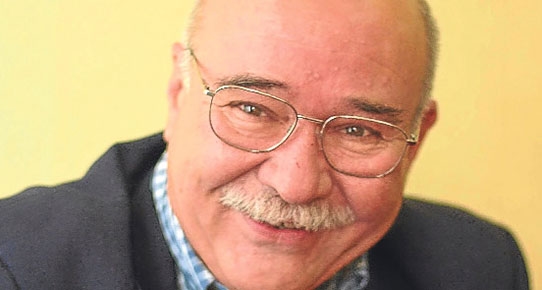 Aydın Engin (columnist, released under judicial control measures). Facing 7.5 to 15 years in prison for “helping a terrorist organization while not being a member”
Aydın Engin (columnist, released under judicial control measures). Facing 7.5 to 15 years in prison for “helping a terrorist organization while not being a member”
Cumhuriyet columnist Aydın Engin has been a journalist since 1969. He has participated in the founding process for many news outlets, including Turkey’s Birgün daily. He worked as a columnist and reporter for Cumhuriyet between 1992 and 2002. He returned to the newspaper in 2015.
 Hikmet Çetinkaya (columnist, board member, released under judicial control). Facing 9.5 to 29 years in prison for “helping a terrorist organisation while not being a member”; two counts of “abuse of power in office”
Hikmet Çetinkaya (columnist, board member, released under judicial control). Facing 9.5 to 29 years in prison for “helping a terrorist organisation while not being a member”; two counts of “abuse of power in office”
Çetinkaya has been with Cumhuriyet for three decades. In the past, the columnist worked as the İzmir Bureau Chief of the newspaper. He was also tried in 2015 along with Cumhuriyet columnist Ceyda Karan for reprinting the Charlie Hebdo cartoons in his column.
 Ahmet Şık (Correspondent, imprisoned since Dec. 30, 2016). Facing 7.5 to 15 years in prison for “helping a terrorist organisation while not being a member”
Ahmet Şık (Correspondent, imprisoned since Dec. 30, 2016). Facing 7.5 to 15 years in prison for “helping a terrorist organisation while not being a member”
No stranger to Turkish prisons, Ahmet Şık worked as a reporter for Cumhuriyret, Evrensel, Yeni Yüzyıl, Nokta and Reuters between 1991 and 2007. He remained in prison for a year in 2011 in an investigation about a shady gang called Ergenekon, believed to be nested within Turkey’s state hierarchy. He is known as one of the most vocal critics of the Fethullah Gülen network.
 İlhan Tanır (former Washington correspondent, resides abroad). Facing 7.5 to 15 years in prison for “helping a terrorist organisation while not being a member”
İlhan Tanır (former Washington correspondent, resides abroad). Facing 7.5 to 15 years in prison for “helping a terrorist organisation while not being a member”
İlhan Tanır previously reported from Washington for Cumhuriyet. His reports and analyses have appeared in many national and international publications. He currently resides in the United States.
 Bülent Yener (Finance Manager). Facing 7.5 to 15 years in prison for “helping a terrorist organization while not being a member”
Bülent Yener (Finance Manager). Facing 7.5 to 15 years in prison for “helping a terrorist organization while not being a member”
A former financial affairs manager with Cumhuriyet, Bülent Yener was released after one day in custody.
Günseli Özaltay (Accounting Manager). Facing 7.5 to 15 years in prison for “helping a terrorist organization while not being a member”
Günseli Özaltay, the newspaper’s accounting manager, was released after one day in custody.[/vc_column_text][/vc_column_inner][/vc_row_inner][vc_basic_grid post_type=”post” max_items=”12″ style=”load-more” items_per_page=”4″ element_width=”6″ grid_id=”vc_gid:1500894514864-6349d62e-4ed7-3″ taxonomies=”8607″][/vc_column][/vc_row]




 Akın Atalay (Cumhuriyet Foundation Executive President; imprisoned since Nov. 12, 2016): Facing 11 to 43 years in prison for “helping a terrorist organisation while not being a member” and “abusing trust”
Akın Atalay (Cumhuriyet Foundation Executive President; imprisoned since Nov. 12, 2016): Facing 11 to 43 years in prison for “helping a terrorist organisation while not being a member” and “abusing trust” Bülent Utku (Cumhuriyet Foundation Board Member, attorney representing Cumhuriyet; imprisoned since Nov. 5, 2016). Facing 9.5 to 29 years in prison for “helping a terrorist organisation while not being a member” and “abusing trust”
Bülent Utku (Cumhuriyet Foundation Board Member, attorney representing Cumhuriyet; imprisoned since Nov. 5, 2016). Facing 9.5 to 29 years in prison for “helping a terrorist organisation while not being a member” and “abusing trust” Murat Sabuncu (editor-in-chief, imprisoned since Nov. 5). Facing 7.5 to 15 years in prison for “helping a terrorist organisation while not being a member” [Turkish Penal Code (TCK) Article 314/2]
Murat Sabuncu (editor-in-chief, imprisoned since Nov. 5). Facing 7.5 to 15 years in prison for “helping a terrorist organisation while not being a member” [Turkish Penal Code (TCK) Article 314/2] Kadri Gürsel (publications advisor, columnist, imprisoned since Nov. 5, 2015). Facing 7.5 to 15 years in prison for “helping a terrorist organisation while not being a member”
Kadri Gürsel (publications advisor, columnist, imprisoned since Nov. 5, 2015). Facing 7.5 to 15 years in prison for “helping a terrorist organisation while not being a member”  Güray Öz (board member, news ombudsman, columnist, imprisoned since Nov. 5, 2015). Facing 8.5 to 22 years in prison for “helping a terrorist organisation while not being a member” and a single count of “abuse of power in office”
Güray Öz (board member, news ombudsman, columnist, imprisoned since Nov. 5, 2015). Facing 8.5 to 22 years in prison for “helping a terrorist organisation while not being a member” and a single count of “abuse of power in office”  Önder Çelik (board member, imprisoned since Nov. 5, 2016). Facing 11.5 to 43 years in prison for “helping a terrorist organisation while not being a member” and four counts of “abuse of power in office”
Önder Çelik (board member, imprisoned since Nov. 5, 2016). Facing 11.5 to 43 years in prison for “helping a terrorist organisation while not being a member” and four counts of “abuse of power in office”  Turhan Günay (editor-in-chief of Cumhuriyet’s book supplement, imprisoned since Nov. 5, 2016). Facing 8.5 to 22 years for “helping a terrorist organisation while not being a member” and a single count of “abuse of power in office”
Turhan Günay (editor-in-chief of Cumhuriyet’s book supplement, imprisoned since Nov. 5, 2016). Facing 8.5 to 22 years for “helping a terrorist organisation while not being a member” and a single count of “abuse of power in office” 
 Hakan Karasinir (board member, imprisoned since Nov. 5). Facing 9.5 to 29 years in prison for “helping a terrorist organisation while not being a member” and two counts of “abuse of power in office”
Hakan Karasinir (board member, imprisoned since Nov. 5). Facing 9.5 to 29 years in prison for “helping a terrorist organisation while not being a member” and two counts of “abuse of power in office” 
 Orhan Erinç (Cumhuriyet Foundation Board President, columnist). Facing 11.5 to 43 years in prison for “helping a terrorist organization while not being a member” ; four counts of “abuse of power in office”
Orhan Erinç (Cumhuriyet Foundation Board President, columnist). Facing 11.5 to 43 years in prison for “helping a terrorist organization while not being a member” ; four counts of “abuse of power in office”  Aydın Engin (columnist, released under judicial control measures). Facing 7.5 to 15 years in prison for “helping a terrorist organization while not being a member”
Aydın Engin (columnist, released under judicial control measures). Facing 7.5 to 15 years in prison for “helping a terrorist organization while not being a member”  Hikmet Çetinkaya (columnist, board member, released under judicial control). Facing 9.5 to 29 years in prison for “helping a terrorist organisation while not being a member”; two counts of “abuse of power in office”
Hikmet Çetinkaya (columnist, board member, released under judicial control). Facing 9.5 to 29 years in prison for “helping a terrorist organisation while not being a member”; two counts of “abuse of power in office”  Ahmet Şık (Correspondent, imprisoned since Dec. 30, 2016). Facing 7.5 to 15 years in prison for “helping a terrorist organisation while not being a member”
Ahmet Şık (Correspondent, imprisoned since Dec. 30, 2016). Facing 7.5 to 15 years in prison for “helping a terrorist organisation while not being a member”  İlhan Tanır (former Washington correspondent, resides abroad). Facing 7.5 to 15 years in prison for “helping a terrorist organisation while not being a member”
İlhan Tanır (former Washington correspondent, resides abroad). Facing 7.5 to 15 years in prison for “helping a terrorist organisation while not being a member”  Bülent Yener (Finance Manager). Facing 7.5 to 15 years in prison for “helping a terrorist organization while not being a member”
Bülent Yener (Finance Manager). Facing 7.5 to 15 years in prison for “helping a terrorist organization while not being a member”